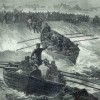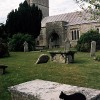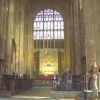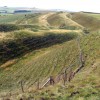Within the great cradle-roll of Dorset’s famous sons the name of Newman Flower is one not likely to be immediately recognisable as are, say Thomas Hardy and William Barnes. Yet in his chosen career he achieved outstanding success, and without him and the other practitioners of his profession the works of the great literary giants like Hardy may never have reached the printed page.
Newman Flower was born in the village of Fontmell Magna in July 1879, the eldest son of the village brewer. Being the elder son it was his father’s wish that he should succeed him in the business, but young Newman was a cerebral lad with far loftier leanings towards the literary world. These aims were further fostered at public school, especially when the boy was required by his father to help him out with the gruelling brewery work during his holidays. Then came the fateful day when he would at last confront his father and tell him that he did not wish to make his living as a brewer, but as a writer and publisher. So when his schooldays were over Flower took the “long white road” out of Fontmell shook the Dorset chalk from his feet and went to London.
As a consequence of following up a job lead he had spotted advertised on a board in an alley one hot summer day, Flower landed his first position as an editorial junior on a military paper called ‘The Regiment.’ Over the time he worked on this paper he acquired a yearning to break into Fleet Street to edit a magazine. To supplement his income in the meantime, he wrote articles for various publications as a freelance, though at first most of these were rejected by the editors he sent them to. However a feature he wrote about train drivers, as well as a few other articles were eventually accepted.
Then came his first big break when W.T. Madge, the proprietor of ‘The People,’ had Flower recommended to him as being the ideal man to write a weekly military column for his daily paper. Ideal, because during his years on ‘The Regiment’ Flower had acquired a considerable wealth of military knowledge. Having passed the test of a specimen article, the ambitious young sub-editor then left ‘The Regiment’ to join the staff of ‘The People’ for the next sixteen years under the alias of “Tommy Atkins.” Flower had realised his ambition: he had arrived in Fleet Street.
But then a more draconian initiation into journalism awaited him; Flower received an invitation from a Harmsworth press editor called Charles Sisley to join the company, which would eventually become Northcliffe Press. Sisley needed a new sub-editor for one of his magazines. Newman then agreed to join Harmsworth’s on the condition that his salary should be supplemented at reduced rates for what he wrote. But Flower had entered a hard school, and Sisley was a hard and humourless taskmaster. He invariably had some criticism about Flower’s weekly paste-ups for the magazine he was working on. Then in 1905, three years after Flower joined Harmsworth’s Sisley had a major disagreement with Alfred Harmsworth (later Lord Northcliffe) and resigned. The “apprentice” was then left to run the magazine as best he could.
Largely out of desperation about the uncertainty of his position, the acting editor wrote to his friend Max Pemberton, asking if he could arrange for him to meet Sir Arthur Spurgeon, then General Manager of the Cassell publishing company. Its founder John Cassell, a Manchester temperance preacher, had built up the business from printing the labels for the tea he was buying up and re-selling in shilling packets as a weapon to fight alcoholism, among the northern industrial masses. But at the time of Newman Flower’s application Cassells was in the red and making heavy losses through incompetent management at board level. After telling Spurgeon that he had decided to accept an offer he had made to join Cassells, Flower learnt that the publishing house had made a £16,000 loss the previous year and the following year’s figures would be worse still.
Yet gradually the paper on which young Newman was employed began to see a revival in its sales. Encouraged by this turn-around Spurgeon invited Flower to design a new fiction magazine. During a holiday in Normandy the latter sketched out the format for the periodical the two men would name ‘The Storyteller.’ This magazine had to be brought out on a shoestring budget of just £1,600, yet it took newsagents by storm. When Flower resigned its editorship 21 years later he found that his creation had netted for Cassells £262,000. Flower had succeeded where the “greybeards” of the board had failed; he had put Cassells back in the black.
Flower then gave up the editorship of all his magazines and bought Cassells from Lords Camrose and Kemsley so that he could devote himself to his growing interest in developing Cassells as a book-house. It was then 1928 and he was 49. He had been publishing magazines for a quarter of a century, and would be publishing books for a quarter of a century more. Through ‘The Storyteller’ he had already published part works of Rudyard Kipling (whom he had met on a train;) G.K. Chesterton, Somerset Maughan and Phillip Oppenheim. But the 25 years or so he would be publishing authors inevitably brought him into intimate contact with many great literary figures.
Under Flower’s management Cassells published Churchill’s ‘Second World War.’ He saw into print Earl Jellicoe’s ‘The Grand Fleet,’ Frederick Treves’ ‘The Elephant Man,’ and H.H. Asquith’s ‘Fifty Years of Parliament.’ He further published or befriended among others R.C. Hutchinson, Lords Curzon and Birkenhead, H.G. Wells, Stefan Zweig, Sir Evelyn Wood, and edited the journals of Arnold Bennett.
But Flower was no mean writer himself, and through Cassells he published several books including some about the two great loves of his life: classical music and gardening. These were ‘G.F. Handel’ (1923;) and ‘Through My Garden Gate’ (1945.) From 1914 to 1920 he was honorary editor of ‘The Dorset Yearbook;’ in 1938 he was knighted.
During the Second World War, La Belle Sauvage, the ancient building off Ludgate Hill which Cassells, occupied was struck and burnt down by a German bomb. In 1947, the horror over, Flower decided to retire from active directorship of the company to make a new home with his wife and son Desmond at Tarrant Keyneston near Wimborne. Here he wrote what is probably his best-known book ‘Just as it Happened’ (1950) which virtually serves as his autobiography-cum-memoirs.
In his business dealings the reputation of Newman Flower is of one considered to be a stern critic but enthusiastic promoter. He was shrewd yet kindly, always willing to give new writers constructive advice. Flower also was actively involved in animal welfare and indeed made several bequests to animal organisations in his will. His propensity for readily seeking out, and befriending authors, even those who did not publish with him, is legendary. One memorable instance of this came during the First World War when he called on Thomas Hardy at Maxgate, the house the author had designed and built for himself, to commission from him a poem for ‘The Dorset Yearbook’ which, as has already been mentioned he was then editing. Hardy gave him the poem “…and something that was far richer: his friendship to the end of his days” as Flower later wrote. Some years later – towards the end of Hardy’s life – Flower, his wife and son, took Hardy and his wife Florence on a memorable picnic by car one blazing summer day, during which they covered many miles of rural Dorset.
The Cassell chief’s general good fortune was well demonstrated on another occasion, this time in 1912 when beneficent fate intervened with an illness and operation. By the time he had recovered, the Titantic – on which he was to have booked a passage – lay broken in two on the bed of the Atlantic. Flower’s operation paradoxically had, of course, saved his life.
After fifty years in publishing (40 with Cassells) and 17 years of fruitful retirement Newman Flower died at his home in Tarrant Keyneston on the 12th of March 1964, aged 85. Such was his fame by that time that on April 1st a memorial service was held for him at St. Pauls, in the presence of noted authors, editors and publishers, as well as of course the then Chairman, Directors and staff of Cassells. The author Ernest Raymond, who’s first book ‘Tell England’ had been published by the company after 11 rejections from other publishers, and whose later works were accepted by Flower personally, gave the address at the service. The music of Handel, which Flower had loved so much, was played on the organ.



